Truthdigger of the Week: Malala Yousafzai
The Taliban tried to kill 14-year-old Malala Yousafzai because people listened when she said they didn’t have to bow to the intimidation of violent, ideological extremists. The Taliban tried to kill 14-year-old Malala Yousafzai because people listened when she said they didn’t have to bow to the intimidation of violent, ideological extremists.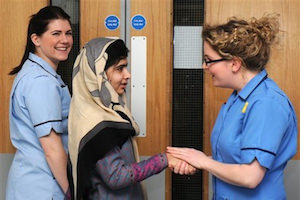
The Taliban tried to kill 14-year-old Malala Yousafzai because people listened when she said they didn’t have to respect the threats of violent, ideological extremists.
Yousafzai was seated on a bus full of schoolgirls in mid-October when a masked man came aboard and shouted: “Which one of you is Malala? Speak up, otherwise I will shoot you all.” She was against Allah and the Taliban, he said, and “must be punished.” On identifying her, he shot Yousafzai in the head at point blank range. The bullet went through her brain and neck before stopping in her shoulder, but it did not kill her.
Yousafzai began to distinguish herself internationally when she appeared as an anonymous blogger for the BBC. A girl four years older first agreed to write what would be a diary of life as a female under the Taliban in the Swat District of Pakistan’s Khyber Pakhtunkhwa province. The fear of attack persuaded her parents to pull her away from the project. Yousafzai’s father Ziauddin, a poet and education rights activist who ran the school the girl attended, allowed his daughter to write the diary instead. She did so anonymously, midway during her seventh grade year.
Her first entry on the BBC’s British site tells of a trip to school haunted by dreams from the previous night about the Taliban and military helicopters. She was afraid to go because the Taliban had banned girls from attending. Their fear mongering worked. Only 11 out of 27 students were in class that day, and the attendance rate dropped as some of her fellow classmates went to other schools.
In the rest of her report, she talks about a trip with her family that she describes as “happy,” rumors of the death of a radio announcer, the start of winter vacation with no indication when school would open again and a night interrupted by the sound of gunfire. The day after the fighting, she met with a friend who “was discussing homework as if nothing out of the ordinary had happened.”
In subsequent entries, written anonymously between January and March 2009, Yousafzai wrote about her displeasure at being banned from school; the atmosphere of war that led one of her brothers to tell their father he was “making a grave” when he was asked what he was doing while playing on the lawn; the robbery of their home; the tears in the eyes of her family when the Taliban announced a peace agreement; and the reopening of the girls’ school with the requirement that students wear burqas.
Conflict between the Taliban and the local government renewed shortly thereafter. Yousafzai’s family was evacuated from their home in Mingora and separated. The Taliban threatened to kill her father for daring to criticize them. Once reunited, she joined him at a meeting with President Obama’s special representative to Pakistan, Richard Holbrooke, with whom she pleaded to help secure Pakistani children’s access to education. Having previously aspired to become a doctor, it was around this time that Yousafzai decided she wanted to become a politician.
“I have a new dream,” she said in a New York Times documentary called “Class Dismissed,” which showed the Taliban’s attempt to deprive Pakistani girls of education. “I must be a politician to save this country. There are so many crises in our country. I want to remove these crises.”
Yousafzai became a spokeswoman for female education once her identity was revealed to the public as early as December 2009. She appeared on television and in the news, sometimes with her father, who had gained a reputation as one of the few people who had resisted the Taliban.
“Those were the most terrible days — the darkest in our history,” her father told a reporter at the Institute for War and Peace Reporting. “We spared no efforts to speak up against terrorism and that struggle brought us into the limelight.” His daughter “got influenced by what was going on and gradually she joined me in our struggle against extremism.”
After a harrowing and uncertain length of time in which Yousafzai was operated on by doctors in Pakistan and eventually Britain, and underwent the early stages of rehabilitation, she was released from Queen Elizabeth Hospital Birmingham late last week. She suffered no physical paralysis and can walk with help, but doctors say the right side of her body may be weak in the future. Likewise, she may not fully recover her ability with language. Her family currently resides in the West Midlands region of the U.K., where she will continue rehabilitation. She is scheduled to undergo cranial reconstruction surgery in late January or early February.
The threat from the Taliban has not gone away. Malala Yousafzai and her father remain on the group’s list of targets. If she returns to Pakistan, the possibility of a second, successful assassination will hang over her like a sword of Damocles. She can’t even be certain that her life is protected abroad, a fact that is unlikely to change as long as she remains committed to the cause of female education wherever the Taliban operate.
For placing her education, fame, influence, and now her life in the service of human rights, we honor Malala Yousafzai as our Truthdigger of the Week.
Your support matters…Independent journalism is under threat and overshadowed by heavily funded mainstream media.
You can help level the playing field. Become a member.
Your tax-deductible contribution keeps us digging beneath the headlines to give you thought-provoking, investigative reporting and analysis that unearths what's really happening- without compromise.
Give today to support our courageous, independent journalists.
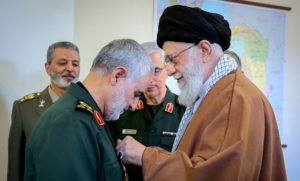
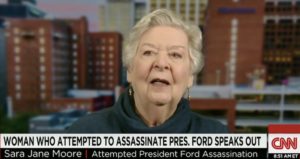

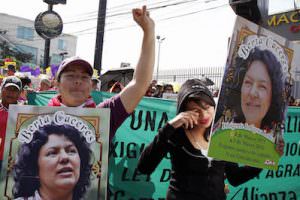
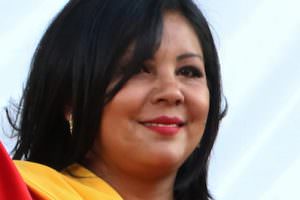
You need to be a supporter to comment.
There are currently no responses to this article.
Be the first to respond.